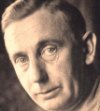 |
|
Frederick Philip Grove
THOUGHTS
(IM 1-14)
e-Edition by Gaby Divay
© August 2007
How to cite this e-Edition
of Grove's Poems: In Memoriam

MAN WITHIN THE UNIVERSE[60]
by
Frederick Philip Grove
I.
Oh, I agree. Who would not stand entranced
When he reflects how far, since Egypt's days,
How wondrously our knowledge has advanced?
We have telegraphy and ultra rays!
We know this earth[61] to
be a cooling ball
Hurled from some fiery nebula and spun
Through infinite space. We know its path a fall
Of spiral loops into a central sun
Where core and crust, with plain and highest crag[62]
Rib-grass and oak, mollusk and vertebrate--
This whole and glorious world-- will be a slag
To liquefy and to evaporate.
Great is our knowledge, variously compiled
Of how things happen. "Law" succeeds to "law";[63]
And, true or false, all are carefully filed:
We can but stand admiring, filled with awe.[64]
II.
Yet of our souls which in this flesh are bound[65]
We know no more than a few fairy tales
Which so-called seers, anxious to compound
A consolation for the heart that ails,
Out of desires and longings and cold fears
Have forged and spread as helps and means to grace.
They all repeat what ever reappears
In new disguise of varied time and place:
The myth of some new life, not of this star,
For which each ending life has never been
But a brief prelude, echoing[66] from
afar
Uranian bliss purged from all things terrene.
A subtle and pervasive irony
Speaks through[67] these
stories meant to make our lives
Appear less shattering to our dignity
Which struggles and, in spite of all, survives.
III.
God, long ago, by kindly impulse fired[68]--
Thus tell the tales--from heaven's window-bar,
By his great fiat created and inspired
The race of men and placed them on a star.
But soon he felt with groans his heaven shake
And doubted of the[69] effort
he had spent.
In his great wisdom he resolved to make
A thorough test of his experiment.
He set aside of his own self a part
Deputing it to live the human life;
And, that unbiased might remain his heart,
He was to own nor home nor friend nor wife.
Thus he came down to share our human lot
And preached to us: we must not[70] aim too high;
For fastened were we[71] to
one hour and spot
And, having lived awhile, were doomed to die.
IV.
He pointed to the lilies of the plain
And to the birds that haunt the pleasant air
That lived and died and did not think it vain
But to exist a season and be fair.
Yet to himself, I think, he smiled[72] and found
An artful means his message to convey
Which after-ages might perhaps expound
In their deep search for what he meant to say.
For he resolved that he himself would die.
"He who has eyes to see with, let him see!"
Thus did he say and then, with rousing cry,
Fixing his eye on death, called, "Follow me!"
Then spoke such things before a festive crowd,
Provoking them, that they, in angry mood,[73]
Hurried him down the street, with clamour loud;,
And raised him high and nailed him to the rood.
V.
There, like a common mortal, did he die[74]
And in his agony obscured the sun.
With his last breath he said, "Tetelestai!"
Or, anglice, "That much, at least, is done!"
He who came down and lived[75] the life
of man,
Himself a God, to make a probing test--
Believe the story as it stands who can--
Decided once for all that Death was best.
And left things as they were. Oh, yes, we[76] move
A little faster o'er this weary earth.
Yet follows life its ancient, rutted groove
And leaves us free to ask what it is worth..........
Still shall the feeling of our impotence[77]
Fire us from day to day with new resolve
And be a challenge consciously prepense
To roll through space where stars on stars revolve.
In Memoriam 12 |
 |
How
to cite this e-Edition: |
Grove, Frederick Philip. POEMS:
In Memoriam Phyllis May Grove. THOUGHTS (IM1-14).
e-Edition, Gaby Divay. Winnipeg: UM Archives & Special
Collections, ©2007.
pEd/
Accessed ddmmmyyyy [ex: 20sep2007] |

|  |
|
|

